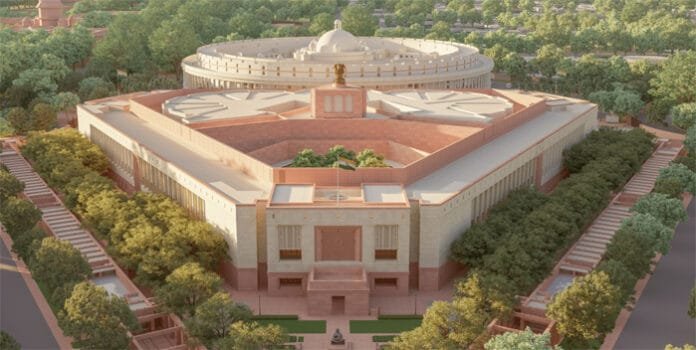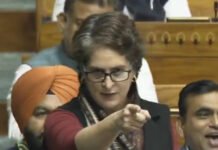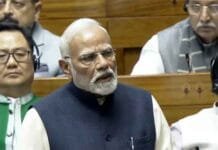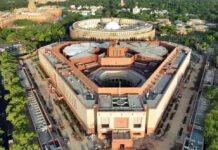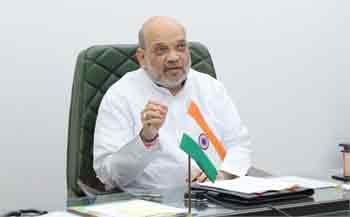The Monsoon Session of Parliament continues to witness intense disruptions, with the 14th day marked by persistent uproar from the opposition benches. The Lok Sabha was adjourned until 12 PM and the Rajya Sabha until 2 PM, as political tensions soared over multiple contentious issues. The Parliament’s working hours are once again being consumed by chaos, slogans, and fiery demands from opposition leaders, particularly around international trade, internal law enforcement actions, and electoral transparency.
14th Day of Parliament Begins with Unrest in Both Houses
As proceedings commenced on the 14th day, immediate protests erupted in both Houses. In Rajya Sabha, the opposition began raising slogans and objecting to the lack of discussion on pressing national and international issues. Despite efforts by the Deputy Chairman to restore order, the pandemonium forced an early adjournment until 2 PM.
In Lok Sabha, the environment was no different. Opposition MPs stormed the well, raising slogans over the US tariff hike on Indian goods, alleged police high-handedness in New Delhi, and SSC examination irregularities. Consequently, Speaker Om Birla adjourned the session till 12 noon as the uproar rendered legislative debate impossible.
Key Issues Triggering the Uproar in Parliament
1. US Tariff Hike on Indian Goods
One of the most critical flashpoints triggering protests is the decision by U.S. President Donald Trump to impose an additional 25% tariff on Indian goods, especially in response to India’s ongoing oil trade with Russia. The total tariff rate, now expected to rise to 50% from August 27, has raised alarm bells across India’s pharmaceutical and export industries.
Independent MP Pappu Yadav from Purnia criticized the move, warning that the increased tariff would “cripple India’s medicine industry” and urged Prime Minister Modi to immediately halt medicine exports to the United States in retaliation.
Samajwadi Party’s Ram Gopal Yadav denounced Trump’s decision as “playing with the global economy,” urging affected nations to formulate a collective strategy. He highlighted India’s dependence on U.S. markets while warning that countries like Sri Lanka, Bangladesh, and Vietnam are outpacing India in textile exports, primarily due to quality and diplomacy gaps.
2. Akhilesh Yadav Slams BJP’s Foreign Policy
Samajwadi Party chief Akhilesh Yadav also launched a scathing critique of the government’s global diplomacy. Referring to PM Modi’s recent comments about paying a “personal price,” Akhilesh said the BJP should have thought of farmers’ welfare 10 years ago. He claimed that India’s so-called strong diplomatic ties have yielded poor returns and accused the Modi government of foreign policy failure.
3. Adjournment Motions on Domestic Policing and Civil Rights
Opposition anger intensified with allegations of arbitrary police detentions in Delhi’s Lodhi Colony. Congress MP Manickam Tagore raised the issue in the Lok Sabha, alleging that individuals were detained merely for speaking Bengali, fueling fears of linguistic discrimination and police overreach.
This has snowballed into a broader civil rights discussion, with West Bengal CM Mamata Banerjee’s administration protesting vehemently against what they call targeted policing of Bengalis outside the state. Congress MPs have presented adjournment motions, demanding an urgent and comprehensive debate on the matter.
Important Bills Passed Amid Chaos on the 13th Day
Despite the unrest, the government managed to push two significant bills through both Houses on the 13th day. These bills, though passed amidst shouting and walkouts, mark a key legislative win for the ruling BJP.
While details remain under discussion, sources confirm the bills pertain to:
Digital Data Governance and Sovereignty
Critical Infrastructure Funding Reforms
These bills were debated and passed in record time, raising questions about parliamentary transparency and deliberative processes. Opposition leaders allege these legislative victories are being rushed without adequate scrutiny, accusing the government of bypassing democratic norms.
Contentious Topics Fueling the Fire
SSC Phase 13 Irregularities
MPs from across the aisle are also raising alarms about irregularities in the SSC Phase 13 examination process. There are claims of question paper leaks, impersonation, and digital fraud, prompting multiple MPs to demand an independent inquiry and immediate intervention by the Ministry of Personnel, Public Grievances, and Pensions.
Entry of CISF Personnel into Rajya Sabha Well
Another point of contention is the alleged unauthorized entry of CISF personnel into the Rajya Sabha well. Opposition members see this as a violation of parliamentary protocol, and a direct threat to democratic decorum. The government has yet to provide an official response, further fueling suspicion and mistrust.
Congress Mounts Pressure with Adjournment Motions
The Congress party has been especially aggressive today, with multiple adjournment notices submitted on the following issues:
US Trade Tariff Policy and its Impact on Indian Exporters
Delhi Police Detentions and Civil Liberties Violations
Election Commission’s SIR drive in Bihar
Growing irregularities in competitive exams
Congress MP Hibi Eden said the U.S. tariff policy must be debated urgently, stressing that a 50% tariff will severely damage India’s export ecosystem, particularly in pharmaceuticals, textiles, and automotive sectors.
Parliamentary Deadlock Persists, But Government Eyes Legislative Agenda
Despite the logjam in discussions, the ruling party is pushing ahead with its legislative calendar, determined to pass crucial bills before the session concludes. Back-channel negotiations are ongoing, with senior leaders exploring the possibility of reaching a temporary ceasefire with opposition parties to ensure some normalcy in both Houses.
Government Strategy: Legislating Amid Uproar
The government appears to be leveraging disruptions to pass bills swiftly—often in the absence of a unified opposition presence. This tactical advantage is helping the BJP expedite its agenda, even as questions about parliamentary integrity and democratic processes remain front and center.
What to Expect Next
As we move into the latter half of today’s proceedings, all eyes are on whether:
Rajya Sabha resumes orderly functioning post-2 PM
Lok Sabha reconvenes with reduced chaos after 12 PM
Key debates on US tariffs and Delhi policing are permitted
New bills are introduced or fast-tracked under continued noise
With the Prime Minister expected to address both Houses later this week, and National Security Advisor Ajit Doval’s diplomatic visit to Moscow, strategic and foreign policy responses may also feature prominently in upcoming debates.
Conclusion: Monsoon Session at a Critical Juncture
The 14th day of the Monsoon Session 2025 underlines the fragile state of Indian parliamentary democracy. As the opposition escalates its protests, and the government accelerates legislative activity, the gap between debate and delivery grows wider. Whether consensus or further confrontation defines the coming days will shape both governance and public trust for the months ahead.

